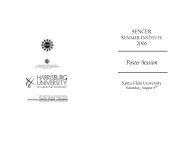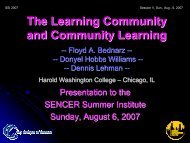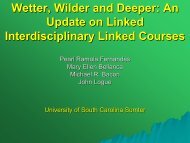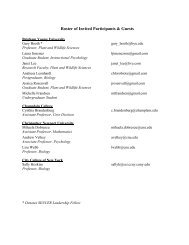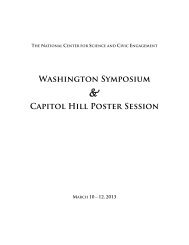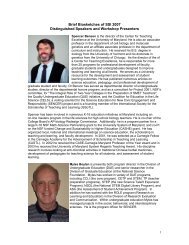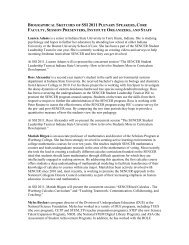Biosketches of invited speakers, Institute facilitators, and ... - SENCER
Biosketches of invited speakers, Institute facilitators, and ... - SENCER
Biosketches of invited speakers, Institute facilitators, and ... - SENCER
Create successful ePaper yourself
Turn your PDF publications into a flip-book with our unique Google optimized e-Paper software.
He has served as director <strong>of</strong> the Center for Education’s St<strong>and</strong>ing Committees on Undergraduate Science<br />
Education <strong>and</strong> Science Education K-12, <strong>and</strong> the National Academies’ Teacher Advisory Council. Jay was the coprincipal<br />
investigator for a multiyear grant from the National Science Foundation to the Center for Education to<br />
<strong>of</strong>fer workshops to grantees <strong>of</strong> the NSF’s Math/Science Partnership Initiative to enable them to better underst<strong>and</strong><br />
<strong>and</strong> implement the recommendations in NRC reports on education. He continues to oversee efforts at the NAS to<br />
confront challenges to teaching <strong>of</strong> evolution in the nation’s public schools <strong>and</strong> oversees a recently exp<strong>and</strong>ed effort<br />
<strong>of</strong> the National Academies to work more closely with disciplinary <strong>and</strong> pr<strong>of</strong>essional societies on education issues.<br />
Prior to assuming his position at the NRC in August 1997, Jay was a member <strong>of</strong> the faculty in the department <strong>of</strong><br />
biology at Colby College in Maine, where he served two terms as chair <strong>of</strong> the division <strong>of</strong> natural sciences,<br />
associate chair <strong>of</strong> the department <strong>of</strong> biology, <strong>and</strong> as a member <strong>of</strong> numerous college committees <strong>and</strong> panels. He<br />
taught courses in Introductory Biology, Mammalian Anatomy <strong>and</strong> Physiology, Animal Behavior, <strong>and</strong><br />
Neurobiology. His research <strong>and</strong> publications in the life sciences have dealt with physiological <strong>and</strong> behavioral<br />
aspects <strong>of</strong> reproduction in mammals. He was responsible for developing <strong>and</strong> overseeing a partnership program for<br />
Colby scientists <strong>and</strong> teachers in four local school districts. Jay also has worked with many national organizations<br />
<strong>and</strong> pr<strong>of</strong>essional societies to improve science education for both pre-college <strong>and</strong> undergraduate students. He<br />
received a bachelor’s <strong>of</strong> science in biology from the University <strong>of</strong> Miami <strong>and</strong> a master’s <strong>of</strong> science in zoology <strong>and</strong><br />
PhD in biological sciences from the University <strong>of</strong> Rhode Isl<strong>and</strong>. He was elected as a Fellow in Education <strong>of</strong> the<br />
American Association for the Advancement <strong>of</strong> Science in 2005 <strong>and</strong> as member-at-large for the Education Section<br />
<strong>of</strong> AAAS for 2009-2013. He also was named a Woodrow Wilson Visiting Fellow in 2008.<br />
At SSI 2010, Jay will lead a work session on “Advanced Issues in Pedagogy <strong>and</strong> Assessment” <strong>and</strong> a<br />
session on “Teaching <strong>and</strong> Communicating Controversial Issues in Science.” He will also co-present a<br />
plenary session on “The Changing Climate <strong>of</strong> Climate Change.”<br />
Amy Joy Lanou, PhD, is assistant pr<strong>of</strong>essor <strong>of</strong> health <strong>and</strong> wellness for the University <strong>of</strong> North Carolina<br />
Asheville (UNCA). She currently teaches Nutrition, Women’s Health, Food Politics <strong>and</strong> Nutrition Policy,<br />
<strong>and</strong> Underst<strong>and</strong>ing Chronic Disease at UNCA. Her current research interests include nutrition for the<br />
prevention <strong>of</strong> chronic disease, how self-efficacy impacts health behaviors, <strong>and</strong> nutrition <strong>and</strong> bone health.<br />
Amy is the co-author <strong>of</strong> Building Bone Vitality (McGraw-Hill; June 2009) <strong>and</strong> Healthy Eating for Life for<br />
Children (John Wiley & Sons, Inc.; Feb. 2002). She publishes regularly on the relationship between dairy<br />
products <strong>and</strong> health concerns. Her most recent paper in the American Journal <strong>of</strong> Clinical Nutrition<br />
delineates the reasons why dairy products should not be recommended in vegetarian diets. Another paper<br />
in Pediatrics titled "Calcium, dairy <strong>and</strong> bone health in children <strong>and</strong> young adults: a reevaluation <strong>of</strong> the<br />
evidence," shows that currently available evidence does not support the notion that dairy product<br />
consumption promotes bone health in young people. She formerly served as the Physicians Committee for<br />
Responsible Medicine (PCRM) nutrition director overseeing nutrition education <strong>and</strong> outreach programs<br />
<strong>and</strong> advocating for healthier diets. She has worked with T. Colin Campbell, PhD, at Cornell University as<br />
a nutrition writer <strong>and</strong> was managing editor <strong>of</strong> his newsletter <strong>and</strong> online journal, New Century Nutrition.<br />
Amy received her bachelor’s <strong>of</strong> science in nutrition science from the University <strong>of</strong> California at Davis <strong>and</strong><br />
her PhD in human nutrition from Cornell University. Her research was focused on body weight regulation<br />
<strong>and</strong> the control <strong>of</strong> food intake.<br />
At SSI 2010, Amy will co-present a session on “Food for Thought: Integrating Learning Across STEM<br />
<strong>and</strong> Non-STEM Disciplines Using Cross-Class Projects.”<br />
Matthew Laposata is an associate pr<strong>of</strong>essor <strong>of</strong> environmental science at Kennesaw State University in<br />
suburban Atlanta <strong>and</strong> a Leadership Fellow for <strong>SENCER</strong>. He received his bachelor's degree in biology<br />
education from Indiana University <strong>of</strong> Pennsylvania, his master’s in biology from Bowling Green State<br />
University, <strong>and</strong> his doctorate in ecology from the Pennsylvania State University. At Kennesaw State, Matt<br />
coordinates the general education science sequence Science, Society, <strong>and</strong> the Environment which serves<br />
59



